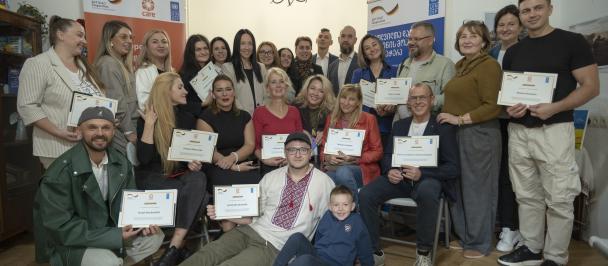UNDP holds the 4th Eastern Europe and Central Asia Regional Judges’ Forum
HIV, Human Rights and the Law
November 18, 2022
The 4th meeting of the Eastern European and Central Asia (EECA) Regional Judges’ Forum on HIV, Human Rights and the Law took place in Tbilisi, Georgia, on 17-18 November. The meeting was co-hosted by Georgia’s High School of Justice, the UNDP Country Office in Georgia and the UNDP Istanbul Regional Hub.
The Forum brought together high-level judges from eight countries of the EECA region – Belarus, Georgia, Kazakhstan, Kyrgyzstan, Moldova, Tajikistan, Ukraine and Uzbekistan. Inputs and engagement were provided from the regions of Africa and Latin America, and representatives of UN organizations, NGOs, and governmental agencies.
The Forum focused on practices and experiences of judges with a background in HIV-related cases that are consonant with human rights principles and seen as advancing HIV jurisprudence. It provided a collegial environment for judges to discuss the latest scientific, medical and epidemiological evidence, international and regional guidance, social and structural factors that increase the vulnerability of people living with HIV and key populations, and judicial and legislative responses to HIV and related national, regional and international laws, and to share experiences and challenges in their work with the protection of rights in the context of HIV and co-infections. The Forum also focused on the issue of criminalization of HIV exposure, transmission, and non-disclosure.
Building on the outcomes and recommendations of the three previous EECA Regional Judges’ Forum meetings in Moldova (2019), Tajikistan (2020) and Ukraine (2021) and under the guidance of the Judges Steering Committee, the 4th Forum sought to discuss the following topics:
- Access to justice, including in the context of emergencies, for people living with HIV, affected by TB and key populations;
- International standards and guidelines, international experience and scientific evidence related to decriminalization of HIV transmission, exposure and non-disclosure;
- HIV status in criminal procedure;
- Risk levels in the context of HIV criminalization and other offences;
- The right to the confidentiality of people living with and affected by HIV – enforcement mechanisms, claiming moral damages for the disclosure of HIV status;
- Claiming moral and material damage for HIV infection;
- HIV and employment: labour disputes;
- Custody and adoption by people living with HIV; and
- HIV as a barrier to marriage and a ground for divorce.
The EECA region saw significant improvements in the legal environment relevant to HIV and TB. However, legal barriers persist and the rights of people living with HIV, key populations at risk of HIV, and people experiencing TB are not sufficiently and effectively protected. Legal, policy and regulatory frameworks that govern national efforts in prevention, treatment, care and support need significant strengthening. Key obstacles include criminalization of HIV transmission, non-disclosure and exposure, criminalization of sex work or introduction of increasingly punitive measures against sex workers, criminalization of drug use and/or possession for personal use, forced and coerced HIV testing and others.
Functional and effective judicial systems are imperative to ensure the protection of the rights of key populations. In this regard, the judiciary in a number of the EECA countries has been quite progressive also through important enabling court decisions.
For media inquiries, please contact:
In Istanbul:
- Karen Cirillo, Digital Communications Specialist, karen.cirillo@undp.org
- Sayed Omer Sadaat, Communications Analyst, sayed.omer@undp.org
In Georgia:
- Sophie Tchitchinadze, UNDP Communications Analyst, +995 599 196907, sophie.tchitchinadze@undp.org

 Locations
Locations



